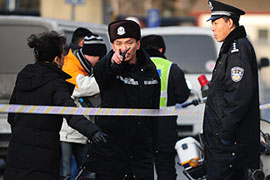China activist’s appeal rejected
International criticism as court upholds 11-year jail term for Liu Xiaobo.

Liu previously spent 20 months in jail for joining the 1989 Tiananmen Sqaure protests, which ended when the government called in the military, killing an unconfirmed number of demonstrators.
‘Prepared for worst’
Earlier this week Liu’s wife, Liu Xia, told the AFP news agency that she was not optimistic that Liu would be given a reprieve.
 |
| China criticised Western critics for meddling in its internal affairs [AFP] |
“I’m preparing for the worst,” she had said. “If you’re not that hopeful, then you can’t be disappointed.”
Al Jazeera’s Tony Birtley reporting from Beijing says the ruling comes as no surprise and many people had expected the outcome.
He added that the verdict could also be seen as a message from the Chinese government to the international community not to meddle in its affairs.
When Liu was convicted in December, China criticised the West for meddling in its internal affairs, saying the case – which included a trial that lasted just half a day – had been “handled in strict accordance with the law”.
Thursday’s ruling sparked international condemnation and calls from Western governments and rights groups for his release.
Last month, four retired Communist Party officials signed an open letter to the government calling for a review of Liu’s case, suggesting his conviction violated some of the principles for which they had fought.
‘Persecution’
Responding to Liu’s jailing, the US condemned what it called the “persecution” of individuals for expressing their political views, saying it was inconsistent with globally recognised human rights standards.
| Who is Liu Xiabao? |
|
|
Jon Huntsman, the US ambassador in Beijing, said in a statement that Washington was “disappointed” with the ruling and called for Liu’s immediate release.
“We believe that he should not have been sentenced in the first place,” he said.
“Persecution of individuals for the peaceful expression of political views is inconsistent with internationally-recognised norms of human rights.”
Diplomats from 17 countries plus the European Union (EU) were outside the court on Thursday.
Simon Sharpe, an official from the EU delegation in China, told reporters that the EU was also calling for Liu’s unconditional release and urged Beijing to “end the harassment and detention of other signatories of Charter 08“.
Sharpe said Liu’s verdict “is entirely incompatible with his right to freedom of expression”.
Human rights group Amnesty International said that by upholding Liu’s verdict, the court had “missed an opportunity to right the wrong”.
“The message is clear, if you criticise the system outside the parameters set by the authorities or independently try to organise civil society, you will be stopped,” said Roseann Rife, the group’s Asia-Pacific deputy director.
Navi Pillay, the UN High Commissioner for Human Rights, said Liu’s case had cast an “ominous shadow” over Beijing’s commitments to protect and promote human rights.
 Liu Xiabao is a literary critic, a former professor of literature and human rights activist
Liu Xiabao is a literary critic, a former professor of literature and human rights activist